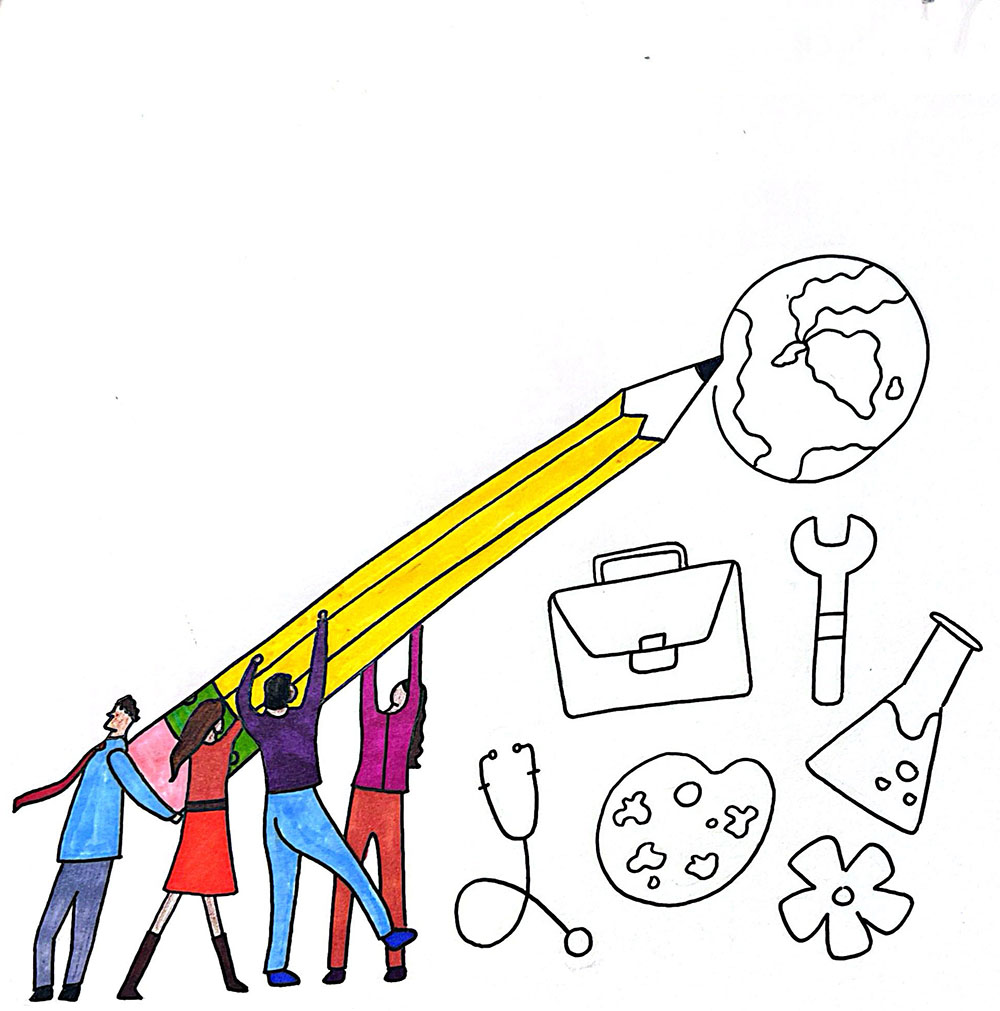Ohio House Bill 68, which will become law on April 23, brings a number of restrictions on transgender children in the state.
The law prohibits health officials from performing any form of gender transition care for minors, prohibits biological males from participating in women’s sports and sets new protocols for how Ohio will deal with transgender children.
Both the Ohio House and Senate voted to override Mike DeWine’s veto of the bill on Jan. 10.
The bill was first passed by the Senate on Dec.13 and vetoed by Governor Mike DeWine on Dec. 29. after he met with families of patients who had received gender reassignment care.
“Many parents have told me that their child would be dead today if they had not received the treatment they received from an Ohio children’s hospital,” DeWine said in his signed veto message. “I have also been told, by those that are now grown adults, that but for this care, they would have taken their lives when they were teenagers.”
DeWine stated in his message that while he may not agree with the entirety of the bill, he still held that action was necessary regarding a number of the issues, such as gender reassignment surgery for those under 18, the lack of comprehensive data regarding gender reassignment care, as well as concerns about clinics that sell inadequate or ideologically-driven treatments.
While DeWine believed that his veto would prompt a compromise between the two sides, the majority of Ohio legislators disagreed. Legislators in support of the bill immediately took action to override the veto; with 65 supporting votes from the House and 24 supporting votes from the Senate– a total of 67% of Ohio legislators–Mike DeWine’s veto was quickly overridden.
Proponents of the Bill:
According to their public statements, proponents of House Bill 68 support the bill based largely on their ethical beliefs and religious values.
The portion of House Bill 68 impacting gender reassignment care–the Saving Ohio Adolescents from Experimentation (SAFE) Act–was primarily sponsored by House Republican Gary Click.
“It is hard to fathom that we live in a society that would tell children that they need drugs and scalpels to live their authentic lives or that treats women as second-class citizens in their own spaces. These are horrible, harmful and hurtful messages for Ohio’s youth, and it is remarkable that we would even need a law to affirm these common-sense policies,” Click wrote in his public message on Jan. 10 after the House of Representatives overrode the governor’s veto.
Representative Click earned his Bachelor’s degree in Religious Education from the Midwestern Baptist College and currently serves as the pastor of Fremont Baptist Temple. Click cited scientific studies in his testimony to the Public Health Policy Committee supporting the SAFE Act.
“Studies demonstrate that 85-95% of children who experience gender dysphoria will naturally identify with their sex after experiencing puberty. However, 98% will have their life choices altered through the use of puberty blockers and proceed with further gender conversion treatments,” Click said.
“Individuals who proceed with gender conversion are 19 times more likely to take their own lives. Contrast this statistic with the claims that gender affirmation saves lives. It does not,” he added.
Alongside Click, Representative Jena Powell stood as the primary sponsor for the Save Women’s Sports Act, the second portion of House Bill 68.
“I am truly grateful that after five years of uphill battles, Ohio females’ rights to safety, fairness, a future in female sports, and female scholar-athlete opportunities are finally protected in Ohio law,” Powell wrote in a press release.
Powell has strongly advocated for the bill since she was first elected in 2019 in hopes to protect the rights and safety of women and girls throughout Ohio. She believes it is fundamentally wrong to allow men to compete in women’s sports, and she claims it could hinder opportunities for student athletes.
Republican State Senator Kristina Roegner strongly advocated to override DeWine’s veto, showing relentless support for the bill.
“Despite what the liberals say, gender is not assigned at birth, but rather from the moment of conception, you are either male or you are female,” said Roegner. “There is no such thing as gender-affirming care. You can’t affirm something that doesn’t exist.”
One of the lobbying organizations that helped push for the bill to be passed in Ohio is the Center for Christian Virtue (CCV), a Christian advocacy organization that supports policies that align with their religious beliefs.
“No child is born in the wrong body, and no girl should lose her right to a fair playing field in Ohio sports. The General Assembly has sent a clear message today to the state: Children should not be experimented on, and we care about the safety and privacy of our girls,” CCV President Aaron Baer wrote in a press release.
An important ally of the CCV, The Catholic Conference of Ohio, a Christian lobbying group, endorsed the bill as its representative stood before the Public Health Policy Committee. The Catholic Conference of Ohio advocates for the positions of the Catholic Church in Ohio on specific issues concerning public policy.
Will Kuehnle, the Associate Director for Social Concerns of the Catholic Conference of Ohio, testified before the committee on Apr. 26, 2023, addressing concerns regarding gender dysphoria and the medical aspects of the bill.
“The Catholic Conference recognizes the significant distress, pain, and complication caused by gender dysphoria,” said Kuehnle. “Personal accompaniment, through dialogue, listening, and empathy is the way of the Gospel, and we believe that this accompaniment must address feelings of dysphoria without resorting to medical interventions that harm a developing body.”
Rather than resorting to medical transformations that the Catholic Conference deems as harmful to a developing body, the Conference believes that religious teaching provides effective treatment for gender dysphoria. Instead of diminishing the concerns of those deemed to be negatively affected by House Bill 68, the Conference explained how they wish to work for what they believe to be a moral civilization, a civilization where children are taught to celebrate their biology rather than change it.
Kuehnle not only addressed moral concerns backing the bill but also a real-world instance as seen in Sweden. Sweden was the first nation to legalize gender reassignment surgeries. Recently, they have started to cut down on hormone therapy for minors after finding that zero out of nearly 10,000 hormone therapy trials for minors were actually randomized.
Opponents of the Bill:
Trans Allies of Ohio is an advocacy group for the transgender community of Ohio run by members of the transgender community, allies and parents of transgender children. Trans Allies of Ohio has helped members of the community advocate against anti-trans legislation.
As a volunteer member of the leadership team for the Trans Allies of Ohio and a parent to a transgender child, Minna Zelch strongly opposed House Bill 68.
“It is incredibly hurtful for transgender and non-binary youth,” Zelch said. “We’ve had families and friends who have already left the state in the last year and a half due to the bill and its detrimental effects.”
Zelch explained that hundreds of families plan on moving out of Ohio due to the bill; many are struggling to do so due to financing and legal custody issues. Zelch addressed misconceptions behind the process of receiving gender-transitioning services and its backing by various medical associations.
“Gender-affirming medical care has been in practice for decades, and it is something that has been basically approved by every major medical association in the country,” Zelch said. “People think that it is something like one day a child can wake up and go to the doctor and get medications or surgery. That can’t happen, there is a very strict process you have to go through.”
Zelch credited the American Psychological Association and the American Academy of Pediatrics as two of the numerous medical associations that back the medical process of transitioning genders.
“It’s clearly not the care that’s the problem, it’s the fact that [Republican Legislators] don’t like transgender people, and so they are trying to prevent transgender people from living full lives in this state,” said Zelch.
Zelch feels the government should not be involved in medical decisions.
“Going through puberty of the opposite gender can be exceedingly detrimental,” Zelch said. “Parents and children should make their own medical decisions, not the government or a person who has never met them before.”
The bill will also affect athletics. Transgender female athletes will not be allowed to participate in girls-only sports but will still be allowed to participate in co-ed teams. A transgender female BHS student who wished to remain anonymous is an athlete who has already undergone hormone therapy.
“I won’t be able to run in any serious track or cross country meets because of it, but I’m already on hormones so I’m grandfathered in,” said the transgender student.
The same student expressed how they believe that House Bill 68 is an extremely unnecessary bill that is nothing but a step back in the fight for equality for the LGBTQ+ community.
The advisers of Beachwood’s Gender and Sexuality Alliance (GSA) also emphasized the detrimental effects of the bill on transgender teens.
“I think that it profoundly impacts our students because it’s essentially saying that their identity, who they are at their very core, is incorrect,” GSA adviser Topher Helm said. “I think that has a huge impact on their mental health because it’s literally just saying that you as a person are not correct.”
Helm and co-advisor Felecia Hamilton are concerned that teens will no longer have access to information about the transitioning process. Hamilton also feels that Ohioans should fault the legislators who perpetrated the bill.
“I think we can fault our legislators for the rhetoric they’ve created around it,” Hamilton said. “House Bill 68 is literally called the SAFE act, which is what? Saving adolescents from experimentation? It’s just really perpetuating misinformation and miseducation about gender, about trans kids, about women’s sports and about identity.”
Helm and Hamilton emphasized that the GSA would continue supporting the trans community at Beachwood. They are talking to trans kids and their parents about what will happen to them when the bill goes into effect.
Beachwood District Director of Athletics Ryan Peters explained how his department will address these changes.
“Beachwood has a very inclusive community, and a very inclusive school district,” he said. “We want people to feel comfortable where they want to compete. Obviously we’re going to follow laws, but we will always fight for our student athletes to make sure that they have the most positive experience.”
At the time of the interview in February, Peters explained that Beachwood’s legal counsel had not yet provided legal updates regarding the bill to BHS. Peters plans on following the advice given to him from the legal counsel as well as standards set in place by the Ohio High School Athletic Association (OHSAA).
Not all opponents of House Bill 68 are members of the Democratic party, Ann Becker, a life-long Catholic Trump supporter and the Vice-Chair of her county’s Republican Party Central Committee, strongly advocated against the bill.
“Today I don’t represent my 65,000 constituents, I represent one – my transgender son,” said Becker in her testimony.
“We as elected officials must be centurions, standing guard at the gate, making sure nothing breaches the freedom of our citizens – even if that breach is coming from our own party,” she said. “Your opposition to this bill will be a political risk, but it’s a risk based on principle. Standing for the freedom and rights of citizens that you might not agree with – but still deserve the right to be free.”
The ACLU of Ohio also opposed the bill, stating that they are ready to support and fight for transgender youth of the state.
“Ohio’s law is an unconscionable attack on transgender youth and their families. Gender-affirming healthcare is safe, effective, and necessary. We are prepared to go to court and defend the rights and dignity of transgender youth with every tool available,” said Chase Strangio, Deputy Director for Transgender Justice at the ACLU.
What is gender transitioning-related care?
Licensed psychologist Ellen Hoffman explained the process of gender transitioning and gender transitioning-related care.
Gender-affirming care (GAC), sometimes referred to as transition-related care, is healthcare for transgender people of all ages. It is not a single category of services but instead a range of services, including mental health care, medical care and social services.
Hoffman works with patients who are questioning their gender or are working to feel more comfortable and happy in their gender identity. She says it is important for transitioning people to have a trained professional who will listen and support them on their journey. As a psychologist, Hoffman helps patients to become self-aware and identify the issues surrounding their gender dysphoria.
Other types of gender affirming care –such as puberty blockers, cross-sex hormones, or surgery from particular mental health providers and/or medical providers–require a specific mental health diagnosis, and/or letters of support for medical interventions.
In the case of minors, parental permission is also involved.
Hoffman says there is a lot of misinformation surrounding gender-affirming care that can cause stress and stigmatization for those who identify as transgender.
She says there are clear, well-established, evidence-based standards of care at all ages for who can access different forms of gender-affirming care and when they are eligible to receive it.
Major medical and mental health organizations– such as the American Medical Association, the American Academy of Pediatrics and the American Psychological Association–have all shown their backing for gender-affirming care.
In 2022 the World Professional Association of Transgender Health (WPATH) released their 8th Standards of Care for treating transgender patients. Both the Endocrine Society and the American Academy of Pediatrics have issued guidelines as well.
The WPATH recommends that health care systems provide medically necessary gender affirming care to transgender and gender diverse people.
The standards also include detailed guidelines for informed consent for treatment.
“If a treatment is to be given [to minors], the legal guardian (often the parent[s]/caregiver[s]) provides the informed consent to do so,” the standards state.
If medications or surgery are part of their gender journey, they are only prescribed after further assessments to ensure they meet prescribing criteria. This can include but is not limited to documentation and referral letters, parental consent and ongoing mental health support.
At all stages, gender-affirming care is only delivered after patients and their families have been counseled, and informed consent has been given. The care itself is only provided to children during appropriate stages of their development; the option for puberty blockers are not available until a patient would start to undergo puberty, and no child would be recommended for any surgical treatment until they are a legal adult.
The standards also recognize that politics play a role in the well-being of transgender people.
“WPATH recognizes that health is not only dependent upon high-quality clinical care but also relies on social and political climates that ensure social tolerance, equality, and the full rights of citizenship,” the standards stated. “Health is promoted through public policies and legal reforms that advance tolerance and equity for gender diversity and that eliminate prejudice, discrimination and stigma.”












![“My parents have always said that education is important. My parents are Chinese immigrants, I'm Chinese American, [and that's a] value that has always been ingrained in our community,” said Senior Lyndia Zheng, pictured with Tony Zheng](https://bcomber.org/wp-content/uploads/2025/10/DSC_4244.jpg)








